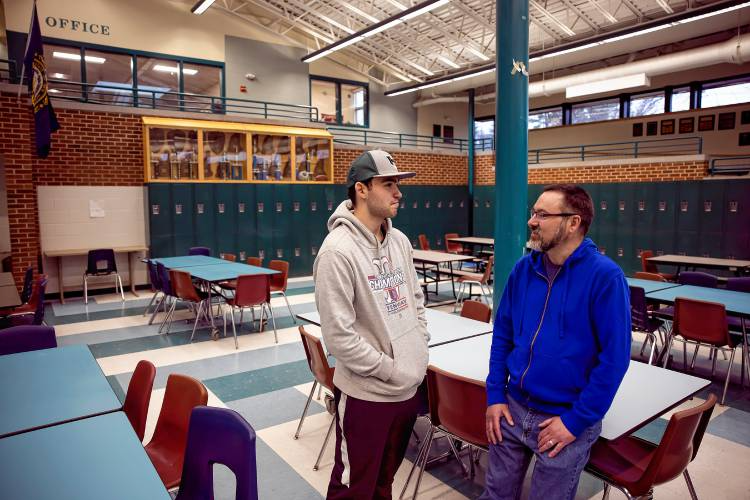[DURHAM]– “Rest assured UNH Housing remains open,” Residential Life stated. This past Thursday UNH announced a transition to orange mode due to a rise of coronavirus (COVID-19) cases within the campus community. Effective Thursday, Feb. 11 at 6 p.m., President James Dean sent an email to all faculty and students with an official statement. “We are seeing a dramatic and sustained rise in the number of positive COVID-19 cases within the Durham community. As a result, effective 6 p.m. today, Feb. 11, 2021, the Durham campus (Manchester and Law remain in yellow) will transition to our orange mode of operation.”
The UNH COVID-19 Lab has seen an intense rise of cases from the start of the spring semester to now. On Feb. 1, 34 students, one faculty member and two staff members tested positive. By Feb. 11, the day it was announced UNH would make the transition to orange mode, 236 students and 3 staff members tested positive. There have been 202 additional cases in less than two weeks of student’s return from winter break according to UNH COVID-19 Lab Dashboard. According to the COVID-19 Lab Dashboard, positive results in the first two weeks of the fall semester averaged to 36.6 positive cases per week versus the 172 averaged per week from the first two weeks of the spring semester. Cumulative data reflects UNH’s initiation of protocols starting in late July for regular screening through COVD-19 testing.
As of Feb. 17 at 8 a.m., there are 383 positive cases of COVID-19 at the Durham campus. Three of these cases belong to staff members, whereas the remainder of the cases belong to students. There are over 1,000 students in isolation and quarantine, 428 being in isolation and 629 in quarantine.
What does “orange mode” really mean for the UNH community? It has been made clear by Dean that all courses are transitioned to fully online, temporarily halting face-to-face instruction, unless otherwise approved. Even though spectators were finally permitted to attend the UNH men’s hockey game on Feb. 12, the announcement of orange mode postponed the pilot program until further notice. All gatherings, on and off campus are limited to six people. Students living in on-campus housing are not allowed to visit other on-campus halls or apartment buildings- including Woodsides and The Gables. Room capacity is lowered: three people for a double, two people for a single and only three additional people for a suite or an apartment; guests are only allowed if they live in your specific, on-campus building. Bathroom capacity has also been lowered in residence halls.
As for off-campus students, they are completely forbidden from entering any on-campus residence halls or apartments.
Strict enforcements were made, and Dean also has safety suggestions that are not required, but strongly advised against. For example, on-campus students are expected not to visit any off-campus students at this time. It was also encouraged to not leave Durham unless it is for business, medical needs or groceries.
Bars and restaurants downtown remain open with regular COVID-19 restrictions.
Labs on Friday were allowed with full PPE, however moving forward, colleges will determine the viability of clinicals, fieldwork and internships as the UNH COVID Lab collects more tests this week. As approved, research and extension operations will continue as approved. Currently, Cooperative Extension and engagement programs are continuing as approved. The Dimond Library and all dining halls are running as usual. The Hamel Recreation Center, and Memorial Union Building (MUB) remain open, but with limited density and distancing. These new limitations are being closely monitored.
At this time, the University is not planning on issuing refunds to any students. Based on President Dean’s email on Thursday, the shift to orange is expected to be temporary. He is in high hopes that the situation will improve in a week; it accounts for two testing days for each student. The situation will be reassessed routinely.
President Dean hopes UNH can go back to yellow mode operations, that is if UNH students, faculty and staff can slow the spread. Simple measures like washing your hands and wearing a mask are important to stop spreading COVID-19, however limiting close contacts, not attending groups greater than six, submitting tests on time and staying within the Durham community are as equally important.
If the spread is not slowed down, there will be additional restrictions that could potentially be the end of athletics practices and games and assigned dining. Those in the research labs could be curtailed to level 4. Students could also be forced into red operations and close down campus.
“We are closely monitoring testing program results and preparing to pivot as needed to protect our community. There were no super spreader events that led to our current levels, so we are optimistic that if we all do our part for about a week, we can get our infection rate under control and resume yellow mode operations. If, however, our testing results do not start showing a decrease in infections after about a week, then we will need to either enact further restrictions or move to red, depending on the trends in the data,” UNH posted on the COVID-19 home page.
“Let’s take care of each other,” the university has stated at the bottom of their Coronavirus Updates and Guidelines page. Following the limited mode of operations expectations can help bring UNH back on track to yellow mode of operations.





















